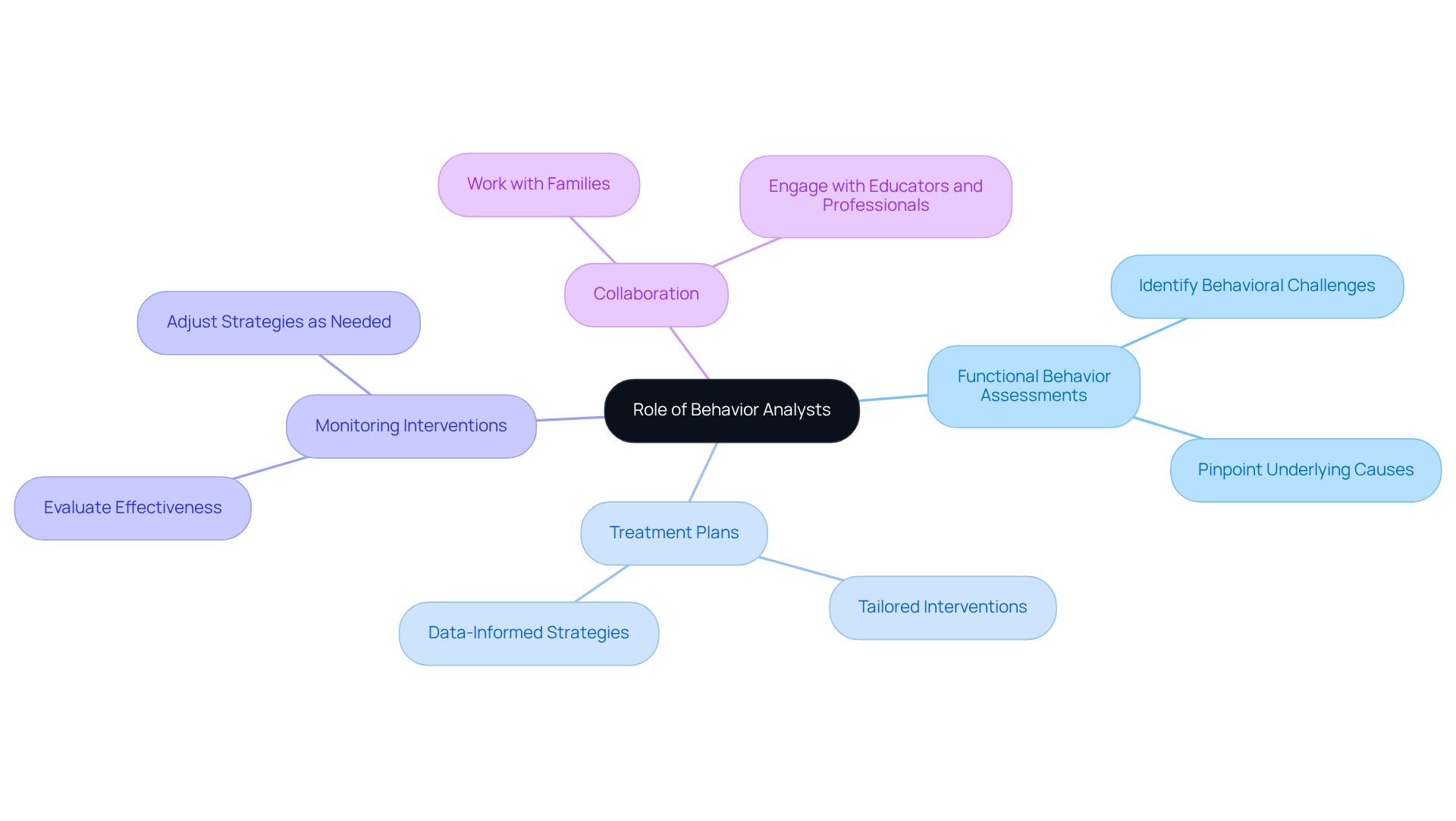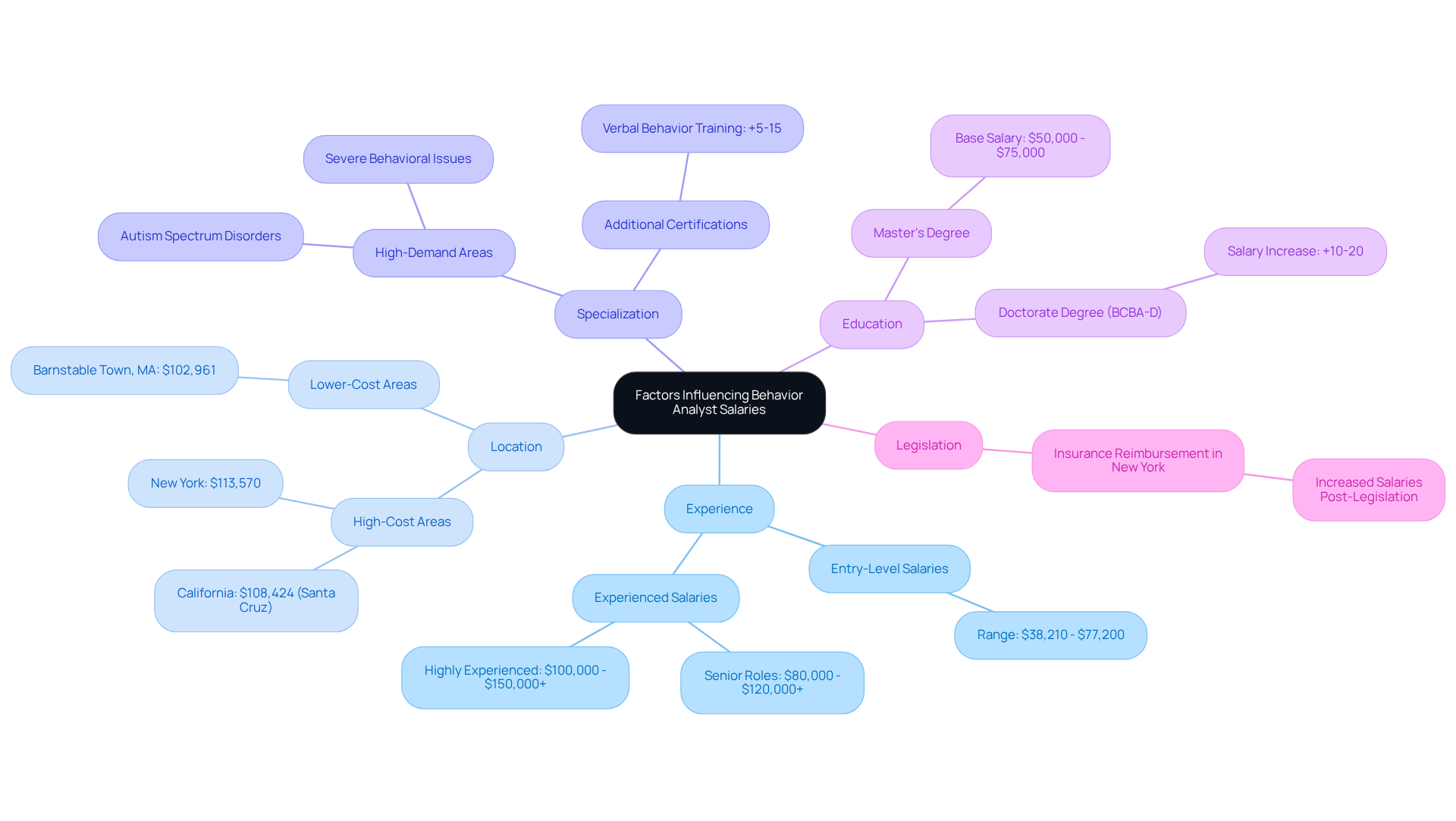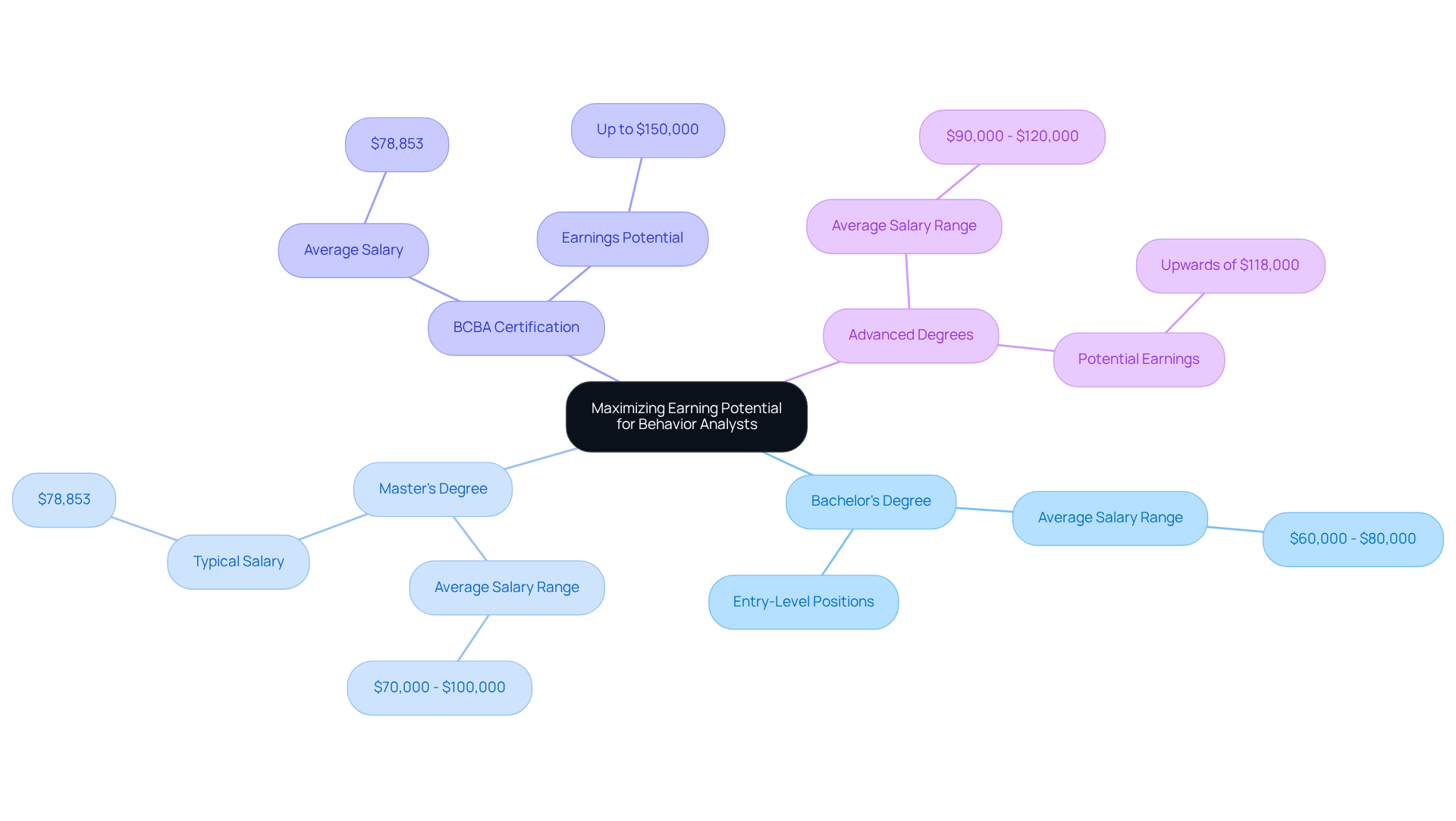October 20, 2025

The demand for Board Certified Behavior Analysts (BCBAs) is on the rise, with the average salary projected to reach approximately $90,263 by 2025. This significant figure underscores the growing need for skilled professionals in this field. Salaries, however, can vary widely based on factors such as experience, location, specialization, and education. For instance, entry-level positions typically earn between $38,210 and $77,200, while experienced analysts in high-demand areas have the potential to exceed six figures.
As you consider your hiring needs, reflect on the challenges you face in finding qualified candidates. Hire ABA is here to help you navigate this competitive landscape and connect with top-tier talent. With our expertise in recruitment, we can streamline your hiring process, ensuring you find the right professionals to meet your organization's needs. Don't miss out on the opportunity to enhance your team with qualified BCBAs who can make a difference.
The role of Board Certified Behavior Analysts (BCBAs) has become increasingly vital in various settings—from schools to clinics—as they work to improve behavioral outcomes for individuals, particularly those with developmental disorders. Did you know that the demand for these professionals is skyrocketing? Understanding the financial landscape is crucial for both aspiring analysts and employers alike.
How much does a behavior analyst make? This question extends beyond mere salary figures; it encompasses a myriad of factors influencing earnings, including:
As the field continues to evolve, insights into behavior analyst salaries reveal both opportunities and challenges that merit deeper exploration. By leveraging this knowledge, you can position yourself or your organization for success in this growing field.
Board Certified Behavior Analysts (BCBAs) are in high demand, playing an essential role in applying analysis principles to evaluate and alter actions across various settings, including schools, clinics, and homes. Their key responsibilities encompass:
The influence of BCBAs on enhancing behavioral outcomes, particularly for individuals with developmental disorders, is significant. In 2025, the average salary for Board Certified Behavior Analysts will provide insight into how much does a behavior analyst make, which is projected to be approximately $90,263, reflecting the competitive nature of this field. Notably, effective interventions by behavior analysts in educational environments have demonstrated considerable advancements in student behavior and academic achievement. Case studies indicate that Applied Behavior Analysis (ABA) therapy significantly improves educational experiences for children with autism.
Are you facing challenges in hiring qualified behavior analysts? Hire ABA offers tailored resume evaluations that align candidates' skills and experiences with the most suitable job opportunities available. By utilizing advanced job fit scoring, we ensure that behavior analysts are matched with roles that suit their preferences and desired locations. The field currently encounters a notable shortage of ABA therapists, underscoring the rising demand for behavior analysts and the importance of their expertise in addressing behavioral health requirements.
As the field continues to expand, the knowledge of board-certified behavior analysts remains essential in meeting the increasing need for effective behavioral health services. Trust Hire ABA to connect you with the right professionals who can make a difference.

The demand for Board Certified Behavior Analysts (BCBAs) has surged dramatically, increasing by 4,209% from 2010 to 2020. This statistic underscores the expanding opportunities in the field and highlights the importance of understanding how much does a behavior analyst make and the factors that significantly influence their salaries.
Experience plays a pivotal role in determining compensation. As of May 2021, entry-level BCBAs typically earn between $38,210 and $77,200, which helps to answer the question of how much does a behavior analyst make based on the 10th percentile to median salary data. As analysts gain experience, they often consider how much does a behavior analyst make, as their earnings can rise significantly, often reaching six figures for senior roles. For instance, skilled BCBAs in New York can earn as much as $113,570 annually, which raises the question of how much does a behavior analyst make, with those in senior positions receiving between $80,000 and $120,000 or more.
Location also critically impacts income disparities. In states with a higher cost of living, such as California and New York, the greater compensation typically leads to inquiries about how much does a behavior analyst make compared to states with lower living expenses. As of July 2023, the typical earnings for analysts in Santa Cruz, CA, is $108,424, while in Barnstable Town, MA, it averages $102,961, prompting an inquiry into how much does a behavior analyst make in these locations.
Specialization can further enhance earning potential. Board Certified Behavior Analysts focusing on high-demand areas, such as autism spectrum disorders or severe behavioral issues, often find that inquiries about how much does a behavior analyst make are common due to their higher salaries. Those with specialized training in verbal skills may earn 5-15% more than their peers, prompting inquiries about how much does a behavior analyst make with additional certifications.
Education and Certification significantly boost earning potential as well. When considering how much does a behavior analyst make, those with a doctorate or specialized credentials can earn 10-20% more than their counterparts holding only a master's degree. Additionally, independent practitioners frequently report earnings that prompt inquiries about how much does a behavior analyst make, ranging from $95,000 to $150,000, with some charging rates approaching $100 per hour, reflecting the financial benefits of establishing their own practices.
The recent insurance reimbursement legislation for ABA services in New York has led to higher compensation for BCBAs, which has a direct impact on how much does a behavior analyst make, further shaping the financial landscape for professionals in this field. Understanding these elements enables aspiring analysts to set realistic income expectations, particularly regarding how much does a behavior analyst make, based on their career choices and market conditions.
Are you facing challenges in hiring qualified behavior analysts? Consider how Hire ABA can address these issues and enhance your recruitment efforts.

When considering how much does a behavior analyst make, it is important to note that salaries demonstrate considerable variation based on geographic location, reflecting local demand and cost of living. Notably, the typical income for Board Certified Behavior Analysts (BCBAs) raises the question of how much does a behavior analyst make, with an average of $89,075, highlighting the financial benefits of certification. In 2023, the demand for BCBA or BCBA-D certified professionals surged by 14%, highlighting the growing need for these roles and prompting inquiries about how much does a behavior analyst make, as this demand influences compensation. For context, Registered Behavior Technicians (RBTs) earn an average income of $36,763, offering a broader perspective on the compensation landscape in Applied Behavior Analysis.
Consider the following key insights into average salaries across major states and cities:
These figures highlight how much does a behavior analyst make based on their geographic location in salary evaluations. Job seekers are encouraged to conduct thorough research on specific cities and states to find out how much does a behavior analyst make in the most lucrative opportunities available in the field of Applied Behavior Analysis.

To maximize earning potential, behavior analysts should consider the following educational and certification pathways:
Investing in education and certification not only enhances job opportunities but also prepares analysts for increased earnings in a rapidly expanding job market. The demand for BCBAs is projected to increase by 25% by 2026. Are you ready to take advantage of this growth? The expected rise of 12% in salaries for behavior analysts over the next five years emphasizes how much does a behavior analyst make and the importance of these qualifications in achieving financial success.

The demand for Board Certified Behavior Analysts (BCBAs) is on the rise, with a projected average salary of approximately $90,263 in 2025. This figure not only highlights the financial rewards of the profession but also underscores the critical need for skilled behavior analysts who provide essential services, particularly to individuals with developmental disorders.
This article has examined the multifaceted factors influencing behavior analyst salaries, such as experience, location, specialization, and educational qualifications. Entry-level BCBAs can expect to earn between $38,210 and $77,200, with significant earning potential as they gain experience and pursue advanced certifications. Geographic disparities also play a crucial role, with analysts in high-demand areas earning notably higher salaries. Additionally, specialized training and advanced degrees are vital, as these credentials often lead to enhanced earning potential.
As the need for qualified behavior analysts continues to grow, it is imperative for individuals in this field to actively seek opportunities for professional development and certification. By investing in education and understanding market dynamics, behavior analysts can position themselves for success in a competitive landscape. The increasing demand for these professionals not only emphasizes their importance in addressing behavioral health needs but also highlights the potential for rewarding careers in behavior analysis.
Are you facing challenges in hiring qualified BCBAs? Consider leveraging Hire ABA for your recruitment needs. With the right support, you can navigate the complexities of finding skilled professionals who will make a difference in your organization.
What is the role of a Board Certified Behavior Analyst (BCBA)?
BCBAs apply analysis principles to evaluate and modify behaviors in various settings, including schools, clinics, and homes. Their key responsibilities include conducting functional behavior assessments, developing and implementing treatment plans, monitoring intervention effectiveness, and collaborating with families and professionals.
What are the main responsibilities of a BCBA?
The main responsibilities of a BCBA include conducting functional behavior assessments to identify causes of behavioral challenges, developing tailored treatment plans based on assessment data, monitoring and evaluating the effectiveness of interventions, and collaborating with families, educators, and other professionals.
How do BCBAs impact individuals with developmental disorders?
BCBAs significantly enhance behavioral outcomes for individuals with developmental disorders, particularly through effective interventions in educational settings, which have shown advancements in student behavior and academic achievement.
What is the projected average salary for BCBAs in 2025?
The projected average salary for Board Certified Behavior Analysts in 2025 is approximately $90,263.
What challenges are currently faced in hiring behavior analysts?
There is a notable shortage of ABA therapists, which highlights the rising demand for behavior analysts and the importance of their expertise in addressing behavioral health needs.
How can Hire ABA assist in hiring qualified behavior analysts?
Hire ABA offers tailored resume evaluations that align candidates' skills and experiences with suitable job opportunities, utilizing advanced job fit scoring to match behavior analysts with roles that fit their preferences and desired locations.
Why is the knowledge of BCBAs essential in the field of behavioral health?
The knowledge of board-certified behavior analysts is essential in meeting the increasing need for effective behavioral health services as the field continues to expand.
Our expert recruitment strategies and AI-driven sourcing ensure that you receive top-notch candidates quickly, without compromising on quality. Whether you’re looking for BCBAs, Clinical Directors, or RBTs, we’ve got you covered.